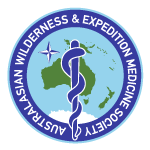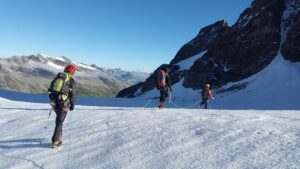How can I upskill in wilderness and expedition medicine (WEM)?
There are several ways to upskill in WEM across Australasia. From first aid courses to tertiary-level training, books to journals, there are a multitude of pathways that can start you on the journey of becoming a confident WEM practitioner.
Here are some organisations that offer wilderness first aid training in Australia:
• https://www.wildernessmedicine.com.au/
• https://www.survivefirstaid.com.au/
• https://www.outdoortrainingcollege.com.au/course_info_first_aid_wilderness.htm
• https://www.5startraining.com.au/first-aid-courses/wilderness-first-aid-new-entrant
• https://www.ails.edu.au/wilderness-first-aid/
• https://tacmed.com.au/public-courses/
• Klepper Training Academy – SE Queensland
St John Ambulance Australia offers remote first aid courses across Australia
• https://www.stjohnqld.com.au/course/remote-first-aid/
• https://www.stjohnvic.com.au/first-aid-training/first-aid-courses/provide-first-aid-in-remote-or-isolated-site/
• https://www.stjohnnsw.com.au/provide-first-aid-in-remote-situations_1024300/
• https://www.stjohnsa.com.au/courses/rafa-0
Here are some remote/outdoors first aid courses in New Zealand:
• https://peaksafety.co.nz/training-courses/cat-2-outdoor-first-aid/
• https://www.first-training.co.nz/first-aid-courses/outdoor-first-aid
• https://www.tripleonecare.nz/first-aid-courses/advanced-outdoor-first-aid-course
• https://www.promed.ac.nz/courses/first-aid-training/outdoor-first-aid/
• https://www.meditrain.co.nz/outdoors-first-aid/
• https://www.redcross.org.nz/first-aid/all-available-courses/pre-hospital-emergency-care/
• https://www.medicfirstaid.co.nz/our-courses/course-types/advanced-pre-hospital-first-aid-course/
• https://buy.stjohn.org.nz/first-aid-training/public-courses/phe/pre-hospital-emergency-care/
Expedition medicine courses in Australia
The University of Tasmania offers an intensive 8-day practical course (https://www.utas.edu.au/health/study/cpdu/expedition-medicine), which can be done alone or as part of the university’s Healthcare in Remote and Extreme Environments Post-Graduate Program. (https://www.utas.edu.au/health/study/postgraduate-coursework/healthcare-in-remote-and-extreme-environments)
RescueMED offers an Advanced Wilderness Life Support course, a 4 day course that focuses on the treatment of the most common injuries and illnesses encountered in the wilderness. https://rescuemed.com.au/advanced-wilderness-life-support/ Credits earned in this course can go towards the Fellowship in the Academy of Wilderness Medicine (FAWM) and ACRRM CPD.
RescueMED also offers a four day Wilderness Medicine Rescue Course (https://rescuemed.com.au/wilderness-rescue-medicine/) designed for medical professionals wanting to broaden their skill base and confidence in delivering medical care in remote settings. It is accredited with WMS, ACRRM and ACEM.
[Disclosure: RescueMED is a commercial enterprise that is owned and operated by AWEMS President Kerryn Wratt.]
Expedition medicine courses in New Zealand
The University of Otago offers WEM as an elective subject as part of their postgraduate certificate/diploma in travel medicine.
https://www.otago.ac.nz/courses/qualifications/pgdiptravmed.html
Journals
Wilderness & Environmental Medicine is the journal of the Wilderness Medical Society, a “peer-reviewed quarterly journal devoted to original scientific and technical contributions furthering research and medical practice related to remote, isolated, austere, or environmentally challenging environments and exposures”.
https://www.wemjournal.org/
Books
There are numerous WEM-themed books out there, but here are some of our favourites…
• The Oxford Book of Expedition Medicine is considered a must have by many! https://oxfordmedicine.com/view/10.1093/med/9780199688418.001.0001/med-9780199688418
• Pocket First Aid and Wilderness Medicine is a comprehensive yet pocket-sized book by Australian doctors Jim Duff + Peter Gormly (https://outdoorsqueensland.com.au/product/pocket-first-aid-wilderness-medicine/)
• Auerbach’s Wilderness Medicine is often seen as “the bible”. Not one to pack for light hiking, though! (https://www.elsevier.com/books/auerbachs-wilderness-medicine-2-volume-set/auerbach/978-0-323-35942-9)
• The Royal Geographic Society have an online ‘textbook’ that is open access and a recommended read. https://www.rgs.org/in-the-field/advice-training/resources-for-expeditions/expedition-handbook/
Guidelines
WMS offer clinical practice guidelines on a variety of vital topics: https://wms.org/research/guidelines
The International Climbing and Mountaineering Federation (IUAA) have their own set of guidelines on areas ranging from traveller’s diarrhoea to altitude sickness: https://theuiaa.org/mountain-medicine/medical-advice/
Wilderness dentistry is an oft-forgotten part of wilderness and expedition medicine. This site (https://wildernessdentistry.com/) offers brilliant education on the topic and is a must-read!
Websites
It would be remiss of us not to mention The Adventure Medic, an excellent site with news, adventure stories, online resources, job information, and more. Well worth a bookmark! (https://www.theadventuremedic.com/)
How can I find work in wilderness and expedition medicine in Australasia?
WEM can be a tricky area to find work in in Australasia, where the industry is not as big as it is in North America and Europe.
The Adventure Medic details jobs and volunteering positions, some of which are in Australia and New Zealand, with some key tips on important issues to consider before taking on such a job.
(https://www.theadventuremedic.com/jobs/)
For Australian doctors, there is also the option of applying to your national Antarctic program – the ultimate wilderness! Also, many cruise ship companies that visit Antarctica are often after medics to work for them.
Another excellent way of working within the industry, and furthering your skills, is to apply to join your local search and rescue team (for instance, https://www.ses.nsw.gov.au/volunteering-details/bush-search-and-rescue-operator/). Remember, though, that these roles are for those with existing knowledge and experience in remote navigation, bushwalking, etc.
One of the best ways, however, is to network with those in the industry. One way of doing this is by attending the annual AWEMS conference!
Humanitarian medicine has natural crossovers with WEM, so working for organisations such as Red Cross International or Medicins Sans Frontieres are other options to consider.
Remember that work in WEM is rarely a full-time career, but rather an interesting and enjoyable side gig for most. It is work you do for the love of it – for the incredible places it can take you, the people you can meet, and experiences you can have.

